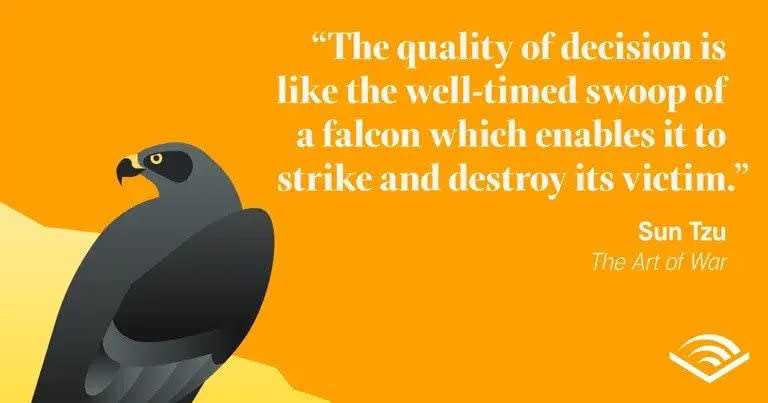It has come a long way from its origins as a war treatise in the 5th century BC, that’s for sure. Chinese general and military strategist Sun Tzu’s The Art of War might have been written in a totally different world to the one we live in but many of the ideas found within this short tract are as applicable in the 21st century as they are all those centuries ago. This is especially true if you happen to find yourself in a position of leadership or having to deal with strategic questions and decisions regularly. Even if you aren’t in those positions, The Art of War has plenty of aphorisms that can be attributed to everyday life. There is plenty of wisdom here, you just have to look for it.
Whether applied to solving practical problems or used as a launching pad for theoretical reflection, the best Sun Tzu quotes from The Art of War will have you looking at things from an altogether different angle. This is a book about strategy and leadership told through the lens of philosophy and wisdom, a reminder that to know yourself is to truly know your enemy, and that the path to supreme excellence is not always the one most travelled. The Art of War by Sun Tzu is a work for all seasons, one in which the wise general ponders everything under the sun through the medium of military strategy and methods of attack.
Yes, The Art of War is a book about military strategy, but it is about so much more than that. Sun Tzu was no ordinary Chinese general, after all, and his words offer as much wisdom today as they ever have. These Art of War quotes will inspire, confound and educate in equal measure, creating clarity in the midst of chaos and helping to bring that greatest victory just a little closer. If not, it also happens to be a pretty tremendous listen.
##Quotes about the philosophy of war
While war is an inherently violent state, there is more to combat than, well, combat. Military strategy is as much about philosophy and foreknowledge as it is about putting troops in the right places. The more philosophical aspects of The Art of War by Sun Tzu offer up some of its most intriguing quotes and theories on the supreme art of war that was utterly revolutionary in 5th century China and still resonate with clarity today. The ideas of a 5th-century Chinese military strategist might not seem like the most obvious starting point for modern metaphors, but don’t be fooled. These philosophical The Art of War quotes will show you a thing or two.
1.“The art of war is of vital importance to the State. It is a matter of life and death, a road either to safety or to ruin.”
2.“All warfare is based on deception.”
3.“It is only one who is thoroughly acquainted with the evils of war that can thoroughly understand the profitable way of carrying it on.”
4.“The skillful soldier does not raise a second levy, neither are his supply-wagons loaded more than twice.”
5.“To fight and conquer in all your battles is not supreme excellence; supreme excellence consists in breaking the enemy's resistance without fighting.”
6.“He will win who knows when to fight and when not to fight.”
7.“If you know the enemy and know yourself, you need not fear the result of one hundred battles. If you know yourself but not the enemy, for every victory gained you will also suffer defeat. If you know neither the enemy nor yourself, you will succumb in every battle.”
8.“What the ancients called a clever fighter is one who not only wins, but excels in winning with ease.”
9.“Making no mistakes is what establishes the certainty of victory, for it means conquering an enemy that is already defeated.”
10.“Water shapes its course according to the nature of the ground over which it flows; the soldier works out his victory in relation to the foe whom he is facing.”
11.“Success in warfare is gained by carefully accommodating ourselves to the enemy's purpose.”
12.“Energy may be likened to the bending of a crossbow; decision, to the releasing of the trigger.”
13.“Anger may in time change to gladness; vexation may be succeeded by content. But a kingdom that has once been destroyed can never come again into being; nor can the dead ever be brought back to life.”
14.“If your opponent is of choleric temper, seek to irritate him. Pretend to be weak, that he may grow arrogant.”
15.“In war, practice dissimulation, and you will succeed.”
16.“If the enemy leaves a door open, you must rush in.”
17.“We cannot enter into alliances until we are acquainted with the designs of our neighbours.”
18.“The experienced soldier, once in motion, is never bewildered; once he has broken camp, he is never at a loss.”
19.“If you know the enemy and know yourself, your victory will not stand in doubt.”
##Quotes on war and leadership
The Art of War initially served as an educational starting point for military strategists and leaders of that time. Sun Tzu’s unique approach to war was revolutionary, and his lessons have remained influential in the centuries since. Throughout The Art of War, Sun Tzu makes it explicitly clear that victory is almost always related to the strength of an army’s leader, and the advice found in the treatise is designed for the use of generals and commanders as a result. Does it translate into ordinary lives in the 21st century? You better believe it does. These quotes about leadership are applicable way beyond the battlefield, after all.
20.“The general who wins a battle makes many calculations in his temple ere the battle is fought. The general who loses a battle makes but few calculations beforehand.”
21.“The general who is skilled in defence hides in the most secret recesses of the earth; he who is skilled in attack flashes forth from the topmost heights of heaven.”
22.“The consummate leader cultivates the moral law, and strictly adheres to method and discipline; thus it is in his power to control success.”
23.“Simulated disorder postulates perfect discipline; simulated fear postulates courage; simulated weakness postulates strength.”
24.“Whoever is first in the field and awaits the coming of the enemy, will be fresh for the fight; whoever is second in the field and has to hasten to battle will arrive exhausted.”
25.“The quality of decision is like the well-timed swoop of a falcon which enables it to strike and destroy its victim.”
26.“All men can see the tactics whereby I conquer, but what none can see is the strategy out of which victory is evolved.”
27.“Do not repeat the tactics which have gained you one victory, but let your methods be regulated by the infinite variety of circumstances.”
28.“He who can modify his tactics in relation to his opponent and thereby succeed in winning, may be called a heaven-born captain.”
29.“The difficulty of tactical manoeuvring consists in turning the devious into the direct, and misfortune into gain.”
30.“Manoeuvring with an army is advantageous; with an undisciplined multitude, most dangerous.”
31.“We are not fit to lead an army on the march unless we are familiar with the face of the country—its mountains and forests, its pitfalls and precipices, its marshes and swamps.”
32.“Move not unless you see an advantage; use not your troops unless there is something to be gained; fight not unless the position is critical.”
33.“No ruler should put troops into the field merely to gratify his own spleen; no general should fight a battle simply out of pique.”
34.“What enables the wise sovereign and the good general to strike and conquer, and achieve things beyond the reach of ordinary men, is foreknowledge.”
35.“When the general is weak and without authority; when his orders are not clear and distinct; when there are no fixed duties assigned to officers and men, and the ranks are formed in a slovenly haphazard manner, the result is utter disorganisation.”
36.“If fighting is sure to result in victory, then you must fight, even though the ruler forbid it; if fighting will not result in victory, then you must not fight even at the ruler's bidding.”
37.“Regard your soldiers as your children, and they will follow you into the deepest valleys; look upon them as your own beloved sons, and they will stand by you even unto death.”
38.“The general who advances without coveting fame and retreats without fearing disgrace, whose only thought is to protect his country and do good service for his sovereign, is the jewel of the kingdom.”
39.“A leader leads by example not by force.”
##Quotes on Strategy
Just like Sun Tzu’s ideas about leadership, his strategic counsel can still be used in the 21st century. The Art of War was ahead of its time when it came to strategy and remains impressively relevant today, with many of the ideas and theories applicable to life away from the battlefield. Whether you are creating a business strategy or devising steps to pursue a personal goal, these quotes from The Art of War may offer some valuable insights and guidance and could well be the difference between seamless success and frustrating failure. The universal wisdom of The Art of War is clear from these quotes on strategy.
40.“Hold out baits to entice the enemy. Feign disorder, and crush him.”
41.“If equally matched, we can offer battle; if slightly inferior in numbers, we can avoid the enemy; if quite unequal in every way, we can flee from him.”
42.“Thus it is that in war the victorious strategist only seeks battle after the victory has been won, whereas he who is destined to defeat first fights and afterwards looks for victory.”
43.“The control of a large force is the same principle as the control of a few men: it is merely a question of dividing up their numbers.”
44.“The clever combatant looks to the effect of combined energy, and does not require too much from individuals.”
45.“You can be sure of succeeding in your attacks if you only attack places which are undefended.”
46.“O divine art of subtlety and secrecy! Through you we learn to be invisible, through you inaudible; and hence we can hold the enemy's fate in our hands.”
47.“Numerical weakness comes from having to prepare against possible attacks; numerical strength, from compelling our adversary to make these preparations against us.”
48.“Knowing the place and the time of the coming battle, we may concentrate from the greatest distances in order to fight.”
49.“In making tactical dispositions, the highest pitch you can attain is to conceal them.”
50.“Carefully compare the opposing army with your own, so that you may know where strength is superabundant and where it is deficient.”
51.“To take a long and circuitous route, after enticing the enemy out of the way, and though starting after him, to contrive to reach the goal before him, shows knowledge of the artifice of deviation.”
52.“Let your rapidity be that of the wind, your compactness that of the forest.”
53.“In raiding and plundering be like fire, in immovability like a mountain.”
54.“Place your army in deadly peril, and it will survive; plunge it into desperate straits, and it will come off in safety.”
55.“Forestall your opponent by seizing what he holds dear, and subtly contrive to time his arrival on the ground.”
56.“Walk in the path defined by rule, and accommodate yourself to the enemy until you can fight a decisive battle.”
57.“At first, then, exhibit the coyness of a maiden, until the enemy gives you an opening; afterwards emulate the rapidity of a running hare, and it will be too late for the enemy to oppose you.”
58.“If it is to your advantage, make a forward move; if not, stay where you are.”
59.“If you know the enemy and know yourself, your victory will not stand in doubt; if you know Heaven and know Earth, you may make your victory complete.”
60.“Let your plans be dark and impenetrable as night, and when you move, fall like a thunderbolt.”
Centuries have passed since Sun Tzu wrote The Art of War, and the lessons are still being revealed today. Many victorious warriors have been born from understanding the ideas at the heart of this famous piece of philosophical military strategy, and the ideas have transposed into ordinary life, inspiring better decision-making and clarity along the way. The Art of War is a book about, well, the art of war, but it is also about the inherent light that guides human beings throughout their tumultuous existence, be it on the battlefield or in the playground. The best Art of War quotes teach us all about this and much, much more.




